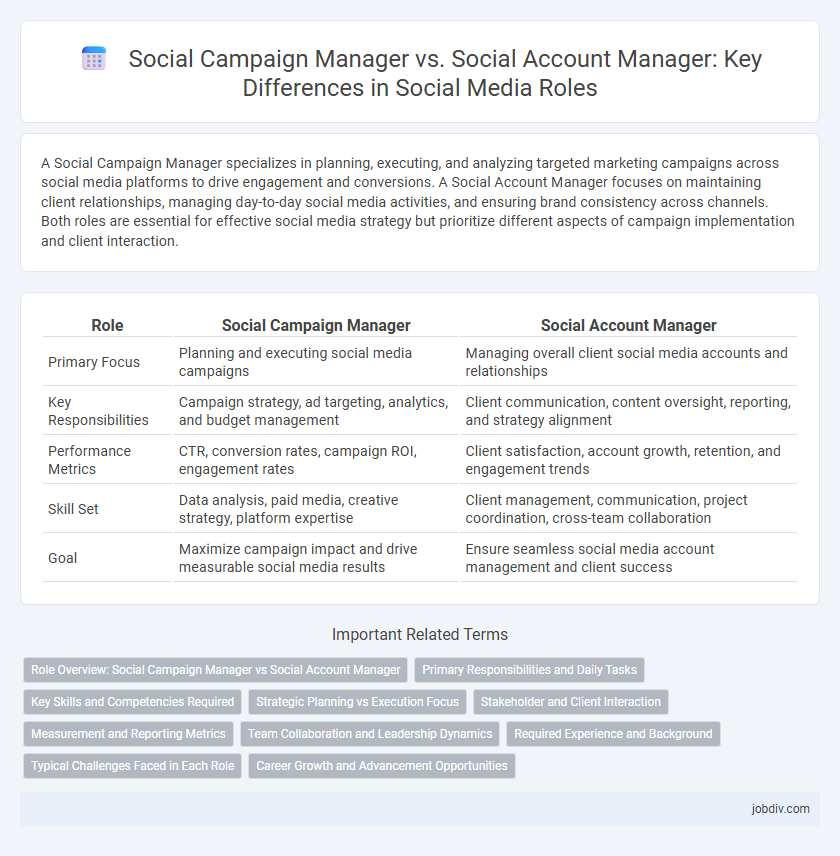A Social Campaign Manager specializes in planning, executing, and analyzing targeted marketing campaigns across social media platforms to drive engagement and conversions. A Social Account Manager focuses on maintaining client relationships, managing day-to-day social media activities, and ensuring brand consistency across channels. Both roles are essential for effective social media strategy but prioritize different aspects of campaign implementation and client interaction.
Table of Comparison
| Role | Social Campaign Manager | Social Account Manager |
|---|---|---|
| Primary Focus | Planning and executing social media campaigns | Managing overall client social media accounts and relationships |
| Key Responsibilities | Campaign strategy, ad targeting, analytics, and budget management | Client communication, content oversight, reporting, and strategy alignment |
| Performance Metrics | CTR, conversion rates, campaign ROI, engagement rates | Client satisfaction, account growth, retention, and engagement trends |
| Skill Set | Data analysis, paid media, creative strategy, platform expertise | Client management, communication, project coordination, cross-team collaboration |
| Goal | Maximize campaign impact and drive measurable social media results | Ensure seamless social media account management and client success |
Role Overview: Social Campaign Manager vs Social Account Manager
A Social Campaign Manager specializes in planning, executing, and analyzing targeted marketing campaigns across social media platforms to drive engagement and conversions. A Social Account Manager focuses on nurturing client relationships, managing daily interactions, and ensuring client satisfaction by aligning social media strategies with overall business goals. Both roles require strong communication skills but differ in scope, with Campaign Managers emphasizing campaign performance and Account Managers prioritizing client management.
Primary Responsibilities and Daily Tasks
A Social Campaign Manager primarily focuses on designing, executing, and analyzing targeted marketing campaigns across social media platforms to drive engagement and conversions. In contrast, a Social Account Manager manages ongoing client relationships, monitors brand presence, and ensures consistent social media content aligns with overall marketing strategies. Daily tasks for Campaign Managers involve campaign performance tracking and ad optimization, while Account Managers prioritize client communication, content scheduling, and reputation management.
Key Skills and Competencies Required
A Social Campaign Manager excels in strategic planning, data analysis, and targeted content creation to drive campaign performance and ROI, demonstrating proficiency in tools like Google Analytics and Facebook Ads Manager. In contrast, a Social Account Manager prioritizes client communication, relationship management, and customized social media strategies, ensuring alignment with brand goals and timely project delivery. Both roles demand strong understanding of social media platforms, creativity, and adaptability, but differ in their focus on execution versus client interaction.
Strategic Planning vs Execution Focus
Social Campaign Managers prioritize strategic planning by developing comprehensive campaign goals, audience targeting, and content calendars to maximize engagement and ROI. Social Account Managers emphasize execution by managing daily client interactions, content publishing, and monitoring performance metrics to ensure campaign effectiveness. Both roles collaborate closely to align high-level strategies with on-the-ground implementation for successful social media marketing.
Stakeholder and Client Interaction
Social Campaign Managers concentrate on orchestrating targeted marketing efforts and collaborate closely with clients to align campaign objectives, ensuring clear communication and timely feedback. Social Account Managers prioritize maintaining strong relationships with stakeholders, acting as the primary liaison to address client needs, resolve issues, and foster long-term partnerships. Both roles demand effective interpersonal skills but differ in focus: campaign execution versus client relationship management.
Measurement and Reporting Metrics
Social Campaign Managers emphasize measurement through detailed campaign performance metrics such as CTR, conversion rates, and ROI to optimize advertising spend and target audience engagement. Social Account Managers focus on broader account-level KPIs including follower growth, engagement rate, and sentiment analysis to maintain brand consistency and client satisfaction. Both roles rely on data-driven reporting tools but apply analytics differently to support tactical campaign success versus strategic account health.
Team Collaboration and Leadership Dynamics
Social Campaign Managers specialize in strategizing and executing targeted marketing campaigns, ensuring precise alignment with brand goals and audience engagement metrics. Social Account Managers focus on maintaining client relationships and coordinating internal teams to deliver consistent content and service quality. Effective team collaboration hinges on clear communication and role demarcation, while leadership dynamics require balancing campaign innovation with client satisfaction to drive overall social media success.
Required Experience and Background
A Social Campaign Manager typically requires experience in digital marketing, data analysis, and campaign strategy, often with a background in marketing, communications, or advertising. In contrast, a Social Account Manager emphasizes client relationship management, content coordination, and brand representation, with experience in customer service, account handling, or public relations. Both roles demand strong social media expertise but differ in focus: campaign execution versus client engagement.
Typical Challenges Faced in Each Role
Social Campaign Managers often struggle with aligning campaign objectives, managing tight deadlines, and optimizing budget constraints to maximize ROI. Social Account Managers typically face challenges in maintaining strong client relationships, addressing diverse client needs, and coordinating cross-functional teams for seamless content delivery. Both roles demand agility in adapting strategies to evolving social media trends and platform algorithms.
Career Growth and Advancement Opportunities
Social Campaign Managers typically focus on strategizing and executing targeted marketing campaigns, offering opportunities to develop skills in analytics, audience segmentation, and creative direction, which can lead to advancement into senior marketing strategist or director roles. Social Account Managers, managing client relationships and overall account health, build expertise in client communication, project coordination, and retention strategies, positioning themselves for careers in client services leadership or business development management. Career growth for both paths depends on enhancing digital marketing proficiency, leadership skills, and adapting to evolving social media platforms.
Social Campaign Manager vs Social Account Manager Infographic

 jobdiv.com
jobdiv.com